牛津译林版(2019)必修 第二册Unit 4 Exploring literature Grammar情态动词课件(共49张PPT)
文档属性
| 名称 | 牛津译林版(2019)必修 第二册Unit 4 Exploring literature Grammar情态动词课件(共49张PPT) | 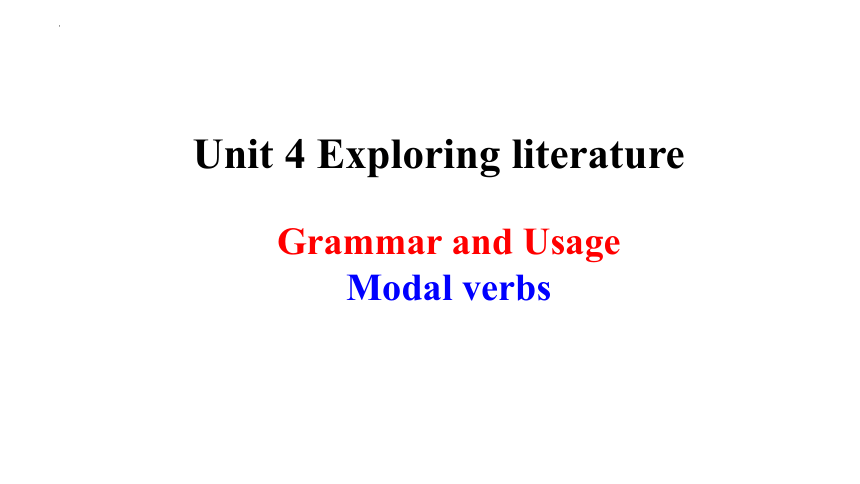 | |
| 格式 | pptx | ||
| 文件大小 | 1.3MB | ||
| 资源类型 | 教案 | ||
| 版本资源 | 牛津译林版(2019) | ||
| 科目 | 英语 | ||
| 更新时间 | 2024-03-27 10:46:04 | ||
图片预览

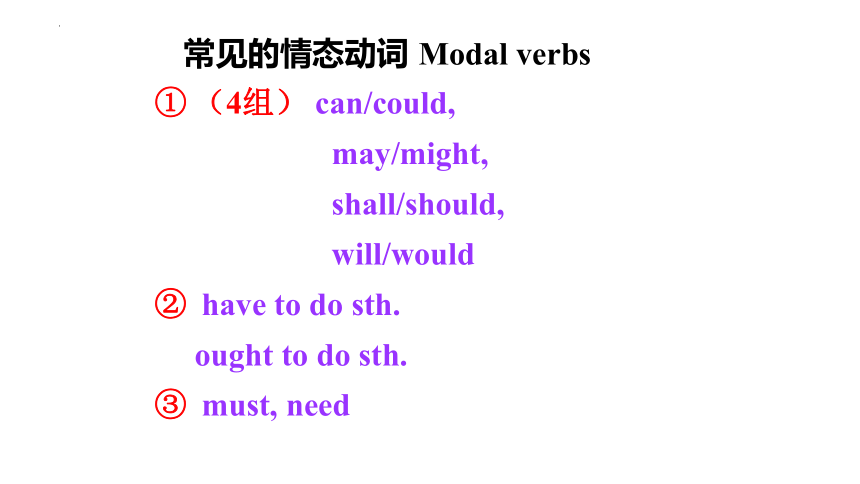
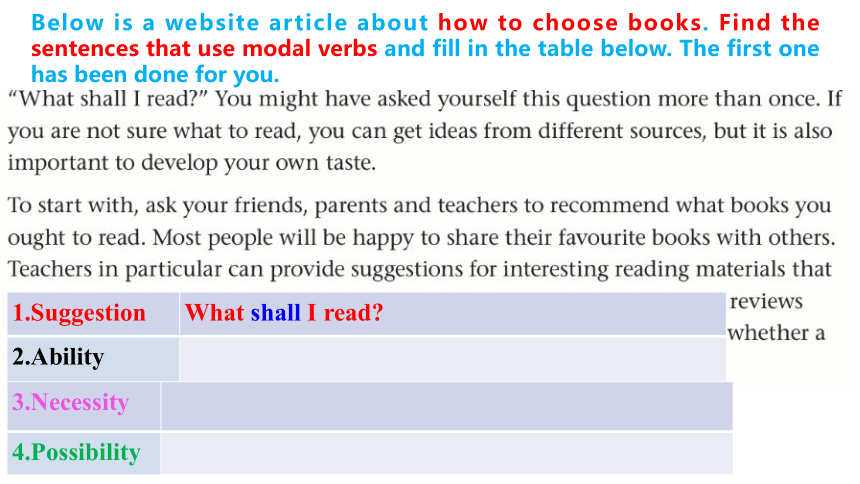
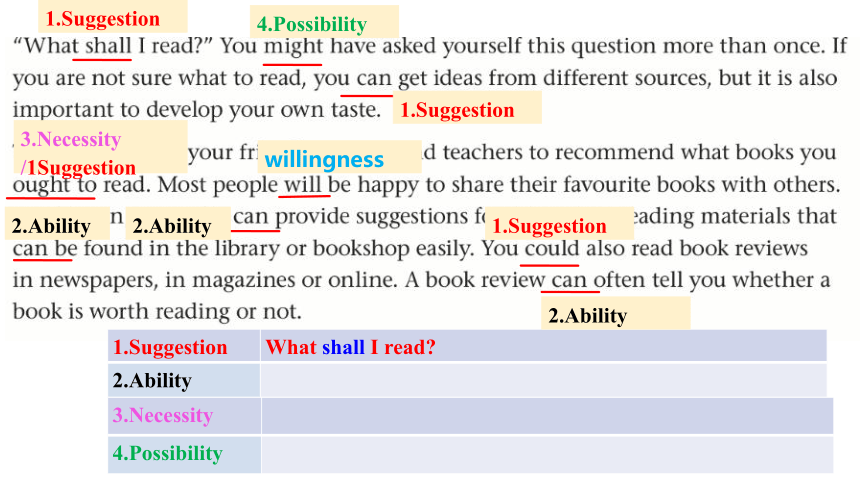
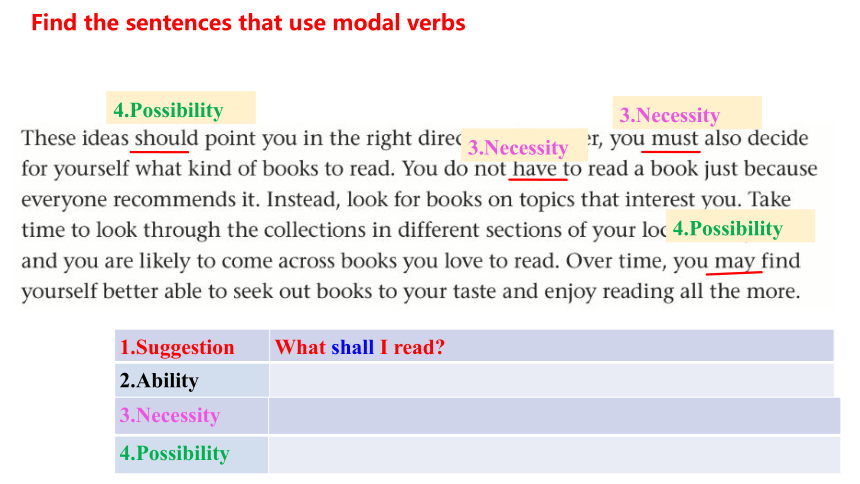
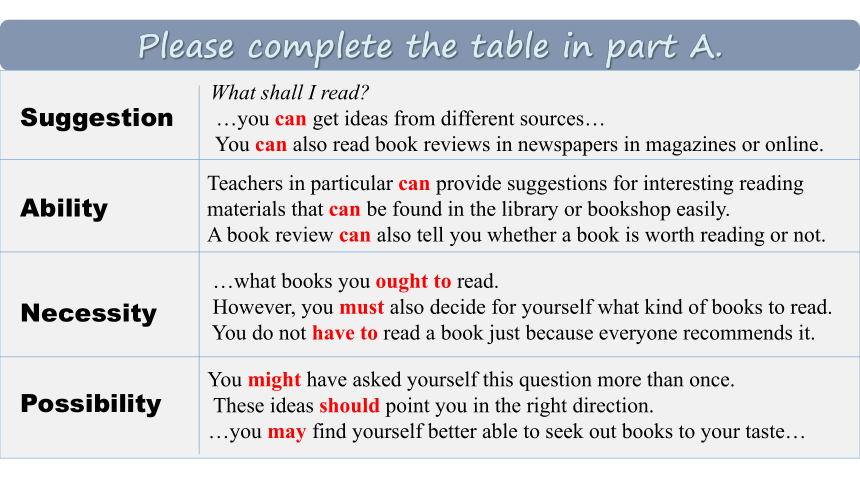
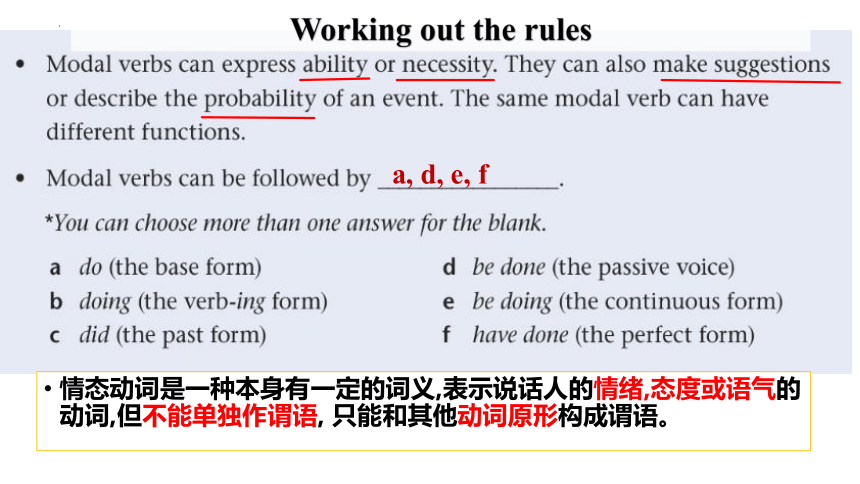
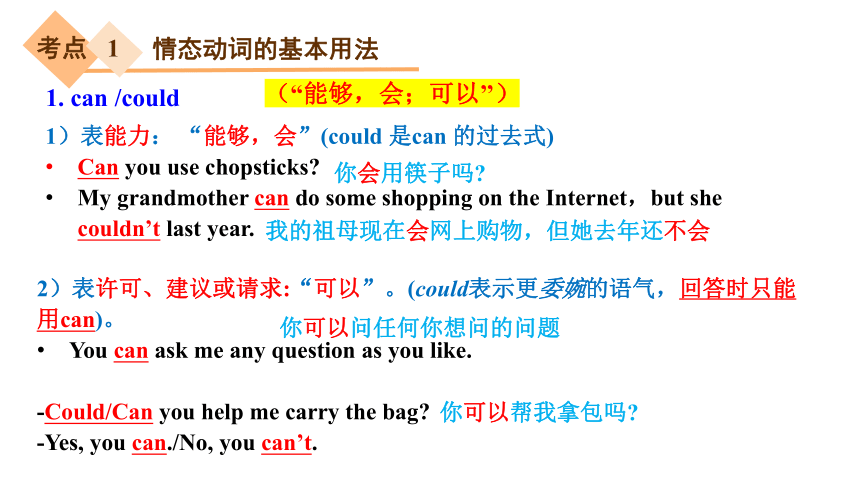
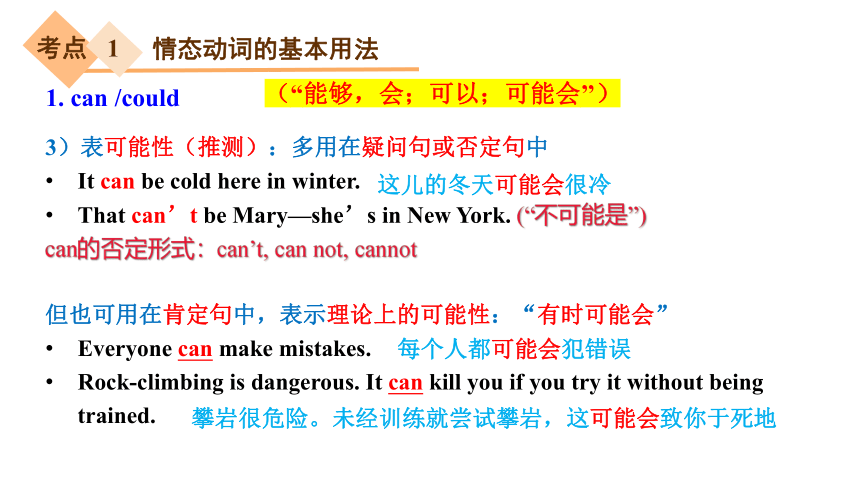
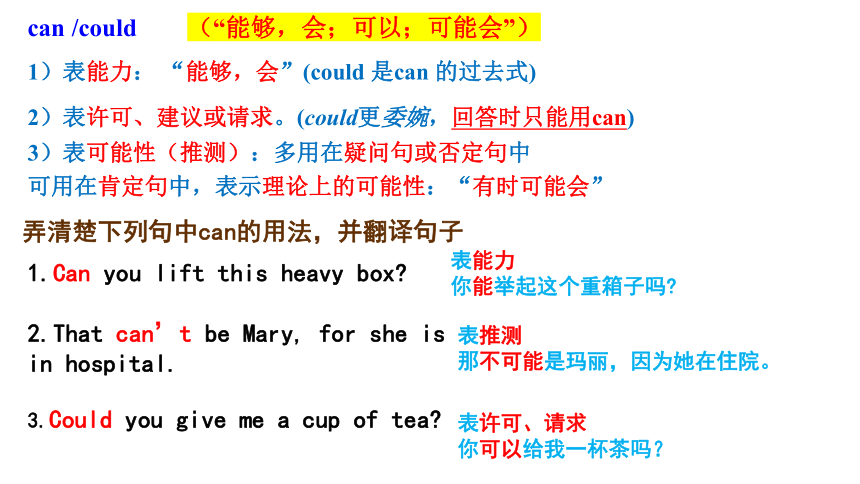

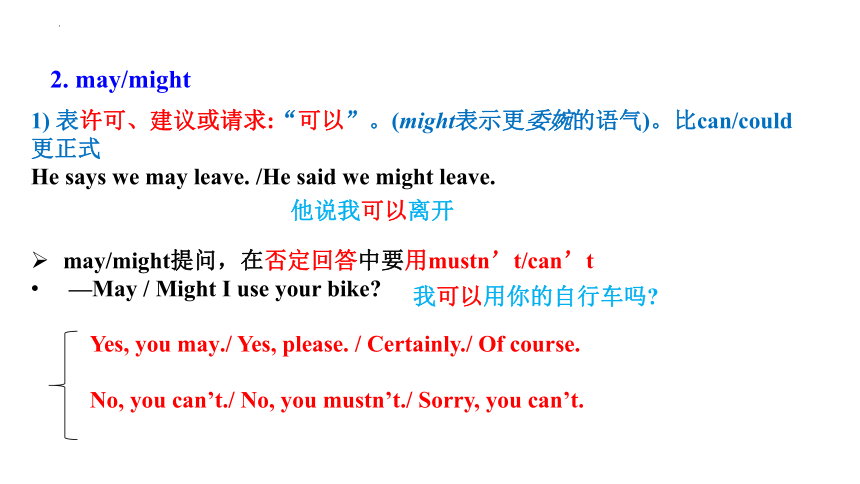
文档简介
(共49张PPT)
Grammar and Usage Modal verbs
Unit 4 Exploring literature
常见的情态动词 Modal verbs
(4组) can/could,
may/might,
shall/should,
will/would
have to do sth.
ought to do sth.
must, need
Below is a website article about how to choose books. Find the sentences that use modal verbs and fill in the table below. The first one has been done for you.
1.Suggestion What shall I read
2.Ability
3.Necessity
4.Possibility
1.Suggestion
1.Suggestion What shall I read
2.Ability
3.Necessity
4.Possibility
4.Possibility
3.Necessity
/1Suggestion
1.Suggestion
1.Suggestion
2.Ability
2.Ability
willingness
2.Ability
Find the sentences that use modal verbs
1.Suggestion What shall I read
2.Ability
3.Necessity
4.Possibility
4.Possibility
4.Possibility
3.Necessity
3.Necessity
Please complete the table in part A.
Suggestion
Ability
Necessity
Possibility
What shall I read
…you can get ideas from different sources…
You can also read book reviews in newspapers in magazines or online.
Teachers in particular can provide suggestions for interesting reading materials that can be found in the library or bookshop easily.
A book review can also tell you whether a book is worth reading or not.
…what books you ought to read.
However, you must also decide for yourself what kind of books to read.
You do not have to read a book just because everyone recommends it.
You might have asked yourself this question more than once.
These ideas should point you in the right direction.
…you may find yourself better able to seek out books to your taste…
Working out the rules
a, d, e, f
情态动词是一种本身有一定的词义,表示说话人的情绪,态度或语气的动词,但不能单独作谓语, 只能和其他动词原形构成谓语。
情态动词的基本用法
1
考点
1)表能力: “能够,会”(could 是can 的过去式)
Can you use chopsticks
My grandmother can do some shopping on the Internet,but she couldn’t last year.
1. can /could
2)表许可、建议或请求:“可以”。(could表示更委婉的语气,回答时只能用can)。
You can ask me any question as you like.
-Could/Can you help me carry the bag
-Yes, you can./No, you can’t.
你会用筷子吗
我的祖母现在会网上购物,但她去年还不会
你可以问任何你想问的问题
你可以帮我拿包吗
(“能够,会;可以’’)
情态动词的基本用法
1
考点
3)表可能性(推测):多用在疑问句或否定句中
It can be cold here in winter.
That can’t be Mary—she’s in New York. (“不可能是”)
can的否定形式:can’t, can not, cannot
但也可用在肯定句中,表示理论上的可能性:“有时可能会”
Everyone can make mistakes.
Rock-climbing is dangerous. It can kill you if you try it without being trained.
1. can /could
这儿的冬天可能会很冷
每个人都可能会犯错误
攀岩很危险。未经训练就尝试攀岩,这可能会致你于死地
(“能够,会;可以;可能会’’)
弄清楚下列句中can的用法,并翻译句子
1)表能力: “能够,会”(could 是can 的过去式)
can /could
2)表许可、建议或请求。(could更委婉,回答时只能用can)
3)表可能性(推测):多用在疑问句或否定句中
可用在肯定句中,表示理论上的可能性:“有时可能会”
1.Can you lift this heavy box
2.That can’t be Mary, for she is in hospital.
3.Could you give me a cup of tea
表能力
你能举起这个重箱子吗
表推测
那不可能是玛丽,因为她在住院。
表许可、请求
你可以给我一杯茶吗?
(“能够,会;可以;可能会”)
1) 表许可、建议或请求:“可以”。(might表示更委婉的语气)。比can/could更正式
He says we may leave. /He said we might leave.
may/might提问,在否定回答中要用mustn’t/can’t
—May / Might I use your bike
2. may/might
Yes, you may./ Yes, please. / Certainly./ Of course.
No, you can’t./ No, you mustn’t./ Sorry, you can’t.
他说我可以离开
我可以用你的自行车吗
2) 表示没有把握的推测,可能性很小:“可能,也许”。
might语气更加不肯定,表示的可能性更小。
He may know you.
He might not be home.
3) may还可表祝愿。
May you succeed!
2. may/might
(“可以;可能,也许;祝愿’’)
他也许认识你
他可能不在家
祝你成功
弄清楚下列句中may的用法,并翻译句子
1)表许可、建议或请求:“可以”。(might更委婉)。比can/could更正式;may/might提问,在否定回答中要用mustn’t/can’t
may/might
2)表示没有把握的推测,可能性很小:“可能,也许”。
might语气更加不肯定,表示的可能性更小。
3) may还可表祝愿
1.May you have a good time.
2.She may be at home today.
3.Might I use your ruler
--Of course.
表祝愿
祝你过得愉快
表推测
她今天也许在家。
表许可、请求
我可以用你的尺子吗? 当然可以
(“可以;可能,也许;祝愿’’)
1)must/have to表示 “必须”。
have to有时态、人称和数的变化,即she has to, she had to, she will have to等
否定形式:①must→→mustn’t“禁止,不准”。
②have to →→needn’t/don’t have to“不必”
I must study hard.
You mustn’t smoke in the office.
You don’t have to attend this meeting.
We will have to think of a new plan.
-Must I report it to you right now
-Yes, you must.
-No, you needn’t./No, you don’t have to.
must提问,肯定回答中要用must,否定回答中要用needn’t/don’t have to(不必)
3. must/have to
我必须努力学习
我们必须/不得不想个新计划
禁止在办公室抽烟
你不必参加这个会议
我必须现在就向你汇报吗?
(“必须’’) mustn’t“禁止,不准”
needn’t/don’t have to“不必”
2)must表示肯定的推测, 意为“一定,准是”,一般用在肯定句中
在否定句、疑问句中要用can’t代替,表示“不可能会”。
The light is still on, so he must be at home.
The light is not on, so he can’t be at home.
3)must表说话人生气或不满的情绪,意为“偏要;非得”。
Must you make so much noise
3. must
灯依然亮着,所以他肯定在家
灯没亮,所以他可能不在家
你非得制造这么多的噪音吗?
(“必须;一定,肯定;偏要,非得’’)
弄清楚下列句中must的用法,并翻译句子
1)must/have to表示 “必须”。
have to有时态、人称和数的变化,即she has to, she had to, she will have to等
否定形式:①must→→mustn’t“禁止,不准”。
②have to →→needn’t/don’t have to“不必”
must提问,否定回答中要用needn’t/don’t have to(不必)
must
2)must表示肯定的推测, 意为“一定,准是”,一般用在肯定句中
3) must表“偏要;非得”
1.Must you leave so early
2.I must go now.
3.You mustn’t swim here.
表偏要
你偏要这么早走吗
表必须
我必须走了。
表禁止
你不准在这游泳
(“必须;一定,肯定;偏要,非得’’)
弄清楚下列句中must的用法,并翻译句子
must/have to表示 “必须”。
have to有时态、人称和数的变化,即she has to, she had to, she will have to等
否定形式:①must→→mustn’t“禁止,不准”。
②have to →→needn’t/don’t have to“不必”
must提问,否定回答中要用needn’t/don’t have to(不必)
3.must
2)must表示肯定的推测, 意为“一定,准是”,一般用在肯定句中
3) must表“偏要;非得”
4.He must be a student.
5.Must I clean the classroom?
--No, you needn’t.
you don’t have to.
表推测
他肯定是个学生
表必须
我必须打扫教室吗 --不,不必了
1) 表职责、义务或建议
Students should respect teachers.
You shouldn’t drink and drive. =You ought not to drink and drive.
2) 表推测/可能性
She should finish the task today.
3)should表说话人的特殊感情,如责备、失望、愤怒; 惊讶(“竟然’’)等
You shouldn’t be late again.
It seems unfair that this should happen to me.
4)条件状语从句(if引导的从句)中,should表“万一,假如’’
If I should see him, I’ll tell him.
If it should rain tomorrow, the sports meeting would be cancelled.
4. should /ought to (1)(2)用法相同
(should“应该;竟然;万一,假如”)
学生应该尊重老师
你不应该喝酒开车
她今天应该能完成这个任务
你不应该迟到
这件事竟然发生在我身上,这似乎太 不合理/不公平 了
(ought to“应该”)
弄清楚下列句中should/ought to的用法,并翻译句子
1)表职责、义务或建议
should /ought to (1)(2)用法相同
2)表推测/可能性
3) should表说话人的特殊感情,如责备、失望、愤怒; 惊讶(“竟然’’)等
1.You shouldn’t have talked to your parents that way.
2.It is so strange that the neighbors should not know each other.
表建议
你不应该那样跟你父母说话
表惊讶
真奇怪,这群邻居竟然互不认识
4)条件状语从句(if引导的从句)中,should表“万一,假如’’
(should“应该;竟然;万一,假如”)
(ought to“应该”)
弄清楚下列句中should/ought to的用法,并翻译句子
1)表职责、义务或建议
should /ought to (1)(2)用法相同
2)表推测/可能性
3) should表说话人的特殊感情,如责备、失望、愤怒; 惊讶(“竟然’’)等
3.Don’t ask me.How should I know
4.We ought to arrive before dark.
5.If you should change your mind, do let me know.
表惊讶、拒绝
别问我,我怎么会知道?
表推测
天黑之前我们应该能到
4)条件状语从句(if引导的从句)中,should表“万一,假如’’
表假如,万一
假如你改变主意的话,一定要告诉我
(should“应该;竟然;万一,假如”)
(ought to“应该”)
1)shall用于第一、第三人称的疑问句中,表示说话人征求对方的意见或向对方请示。
如:
Shall we go out for a walk
Where shall he wait for us
2)shall用于第二、第三人称,表示说话人给对方的命令、警告、允诺、威胁、义务或规定
You shall suffer for this if you won’t listen to me.
You shall do as I say.
All the students shall observe the school rules.
5. shall
出去散步,好吗
他会去哪等我们
如果你不听我的,你会吃苦头的
必须要按我说的做
所有学生都必须遵守学校规则
(“会,要,将;必须’’)
弄清楚下列句中shall的用法,并翻译句子
1)第一、第三人称的疑问句中,表示说话人征求对方的意见或向对方请示
shall (“会,要,将;必须’’)
2)第二、第三人称,表示说话人给对方的命令、警告、允诺、威胁、义务或规定
1.Shall we begin our meeting?
2.You shall be punished for what you have done.
3.The new law shall come into effect next month.
表征求意见、向对方请示
要开始会议吗
表警告
你会为你所作所为受到惩罚
表规定
新法将于下个月生效
1)表示“意志”、“意愿”或“决心”等,will指现在,would指过去
I will tell you all about this matter.
Tom won’t do such a thing.
He said that he would not make that mistake again.
2) 疑问句中,表示提出“请求”或“询问”。would比will更委婉
Will you please tell her the news when you see her
Would you please be quiet
3) 表示习惯性的动作,有“总是”“习惯”的含义。will指现在,would指过去
She’ll listen to music in her room.
When I passed my school I would see my teachers who taught me 5 years ago.
6. will / would
我会告诉你关于这件事的所有情况
汤姆不会再做这种事
他说他不会再犯那种错误了
当你看见她的时候,请你告诉她这条消息,可以吗
请安静,好吗
她总是在房间里听音乐
当我路过我的学校时,我总是会去看我五年前的老师
(“会,要,将;请;总是,习惯’’)
弄清楚下列句中will/would的用法,并翻译句子
1)表示“意志”、“意愿”或“决心”等,will指现在,would指过去
will/would
2)表示习惯性的动作,有“总是”“习惯”的含义。will指现在,would指过去
1.Would/Will you please close the window
2.I will do anything for you.
3.When we were children,we would go swimming every summer.
表请求
请把窗户关上好吗
表意愿
我愿为你做任何事
表习惯,总是
小时候,每年暑假我们总是会去游泳
(“会,要,将;请;总是,习惯’’)
3) 疑问句中,表示提出“请求”或“询问”。would比will更委婉
可作情态动词,也可作实义动词。
作情态动词时后面+do sth.(动词原形),无人称、数的变化,无过去时;否定形式:needn’t
作实义动词时后面+to do sth.,有人称、数的变化,有过去时,
即he needs, he needed;
否定形式:don’t need, doesn’t need, didn’t need
He need finish the job before dark.
He needs to finish the job before dark.
He needn’t finish the job before dark.
He doesn’t need to finish the job before dark.
7. need 必要,需要
可作情态动词,也可作实义动词。
作情态动词时后面+do sth.(动词原形),无人称、数的变化,无过去时;否定形式:needn’t
作实义动词时后面+to do sth.,有人称、数的变化,有过去时,
即he needs, he needed;
否定形式:don’t need, doesn’t need, didn’t need
翻译
你不需要担心他
You needn’t worry about it.
You don’t need to worry about it.
7. need 必要,需要
可作情态动词,也可作实义动词。dare与need的用法相似。
作情态动词时后面+do sth.(动词原形),无人称、数的变化,
但有过去时,即dared;否定形式:daren’t
作实义动词时后面+to do sth.,有人称、数的变化,有过去时,即dares, dared;
否定形式:don’t dare, doesn’t dare, didn’t dare
特殊:否定句和疑问句中to可以省略.
He dare not go out now.
He doesn’t dare (to) go out now
He dared to travel abroad when he was young.
How dare you say that
7. dare 敢
翻译
1. How dare you let your little child go out alone
你怎么敢让你的孩子肚子外出?
2. I didn’t dare to say a word.
我不敢说一个字
3. Nobody dared to ask any questions.
没人敢问我的问题
4. He dares to challenge all kinds of difficulties.
他敢于挑战各种困难
5.He daren't speak English in public.
他不敢在公共场合说英语
7. dare 敢
情态动词 中文
can/could
may/might
must
have to
should
ought to
shall
will/would
need
dare
能够,会;可以;可能会
可以;可能,也许;祝愿
必须;一定,肯定;偏要,非得
不得不,必须
应该;竟然;万一,假如
应该
会,要,将;必须
会,要,将;请;总是,习惯
必要,需要
敢
表推测的情态动词有哪些
表推测的情态动词
1. 对现在或客观事实的肯定推测
must:肯定;准是;想必是
should/ought to:很可能;应该…, 指按常理推测
may/might:也许,大概,表示把握不大、可能性很小的推测
can/could:可能(多用于疑问句和否定句)
1. —What are you doing this Saturday
—I’m not sure, but I might/may go to the cinema.
2. —Good morning. I’ve got an appointment with Miss Smith in the Personnel Department.
—Ah, good morning. You ______ be Mrs. Peter.
A. might B. must C. would D. can
2
考点
2.对现在情况或客观事实的否定推测
can’t:不可能;推测的语气相当有把握
couldn’t:不可能;语气较委婉
may(might) not:可能不;也许不,推测表不大有把握
It can’t be Jane at the door. It’s only three o’clock. She should be at school now.
The younger people might not like the idea.
3. 对过去情况的推测
must have done: 过去一定做过某事
can’t/ couldn’t have done: 过去不可能做某事
can/could have done: 过去可能做过某事
may/might have done: 过去可能做过某事(不太有把握)
may/might not have done: 过去可能没做过某事(不太有把握)
1. Since nobody gave him any help, he ____ have done the research on his own.
A. can B. must C. would D. need
2. Why are your eyes so red You ______ have slept well last night.
A. can’t B. mustn’t C. needn’t D. won’t
3. 对过去情况的推测
must have done: 过去一定做过某事
can’t/ couldn’t have done: 过去不可能做某事
can/could have done: 过去可能做过某事
may/might have done: 过去可能做过某事(不太有把握)
may/might not have done: 过去可能没做过某事(不太有把握)
翻译句子
1. Tom may have gone to Shanghai yesterday, but I’m still not sure about it.
汤姆昨天可能已经去了上海,但是我还不能肯定。
2. The ground is rather wet, so it must have rained last night, didn’t it
地面很湿,所以昨晚一定下雨了,对不对?
情态动词+ have done 的其他用法
should/ought to have done
shouldn’t/ ought not to have done
needn’t have done
could have done
3
考点
1. should/ought to + have done
表示过去本应该做却没有做的情况,表示说话人后悔、遗憾或责备的语气。
﹡I really regret wasting the hours when I should have studied hard.
我真的很后悔该努力学习的时候浪费了太多时间。
Translate:
—Sorry, Mum! I failed the job interview again.
—Oh, it’s too bad. You should have made preparations.
Instead you spent all your time playing computer games.
你本应该好好准备的,而你却用了所有的时间玩电脑游戏。
2. shouldn’t/oughtn’t to + have done
与前面的相反,shouldn’t /oughtn’t to + have done表示本不该做某事却已经做了,也表示说话人后悔或责备的语气。
﹡You shouldn’t have watched TV last night.
你们昨晚本不应该看电视的。
Translate:
I shouldn’t have watched that movie — it’ll give me horrible dreams.
我不该看那部电影的,它会让我晚上做噩梦的。
3. needn’t + have done
表示过去做了不必要的事,可译为“本可不必”等。
﹡ You needn’t have visited my uncle, as he has been all right for long.
其实你不必去探望我叔叔的,因为他已经痊愈了好长一段时间了。
Translate:
I needn’t have worried before I came to the new school, for my classmates here are friendly to me.
在去新学校之前我本不必担心的,因为我的同学对我很友好。
4. could + have done
“本来可以/能够做却没做”,表示懊恼和惋惜。
﹡You could have done better,but you were too careless.
你本来能够做得更好,但你太粗心了。
Translate:
He could have escaped, but he chose to stand and fight.
他本可以逃跑的,但是他选择留下来战斗。
1. 他意识到一定有什么人进过他的房间。
He was aware that someone ___________________ his room.
2. 谁会想到你会做出这样的事情?
Who _____________________ you did such a thing
3. 你这么晚的时候本不应该一个人来这里的。
You ____________________________ here alone at such a late hour.
must have entered
could have supposed
shouldn’t/oughtn’t to have come
Exercises
4. 她本不必亲自来——写封信来就足够了。
She ________________ in person—a letter would have been enough.
5. 我找不到我的钥匙了。我可能昨天把它们落在学校了。
I can’t find my keys. I __________________ them at school yesterday.
needn’t have come
may/might have left
B1
P49B1
ability
permission
possibility
permission
necessity
possibility
possibility
suggestion
can't
P49B2
must
could
must
can
should
ought to
Grammar and Usage Modal verbs
Unit 4 Exploring literature
常见的情态动词 Modal verbs
(4组) can/could,
may/might,
shall/should,
will/would
have to do sth.
ought to do sth.
must, need
Below is a website article about how to choose books. Find the sentences that use modal verbs and fill in the table below. The first one has been done for you.
1.Suggestion What shall I read
2.Ability
3.Necessity
4.Possibility
1.Suggestion
1.Suggestion What shall I read
2.Ability
3.Necessity
4.Possibility
4.Possibility
3.Necessity
/1Suggestion
1.Suggestion
1.Suggestion
2.Ability
2.Ability
willingness
2.Ability
Find the sentences that use modal verbs
1.Suggestion What shall I read
2.Ability
3.Necessity
4.Possibility
4.Possibility
4.Possibility
3.Necessity
3.Necessity
Please complete the table in part A.
Suggestion
Ability
Necessity
Possibility
What shall I read
…you can get ideas from different sources…
You can also read book reviews in newspapers in magazines or online.
Teachers in particular can provide suggestions for interesting reading materials that can be found in the library or bookshop easily.
A book review can also tell you whether a book is worth reading or not.
…what books you ought to read.
However, you must also decide for yourself what kind of books to read.
You do not have to read a book just because everyone recommends it.
You might have asked yourself this question more than once.
These ideas should point you in the right direction.
…you may find yourself better able to seek out books to your taste…
Working out the rules
a, d, e, f
情态动词是一种本身有一定的词义,表示说话人的情绪,态度或语气的动词,但不能单独作谓语, 只能和其他动词原形构成谓语。
情态动词的基本用法
1
考点
1)表能力: “能够,会”(could 是can 的过去式)
Can you use chopsticks
My grandmother can do some shopping on the Internet,but she couldn’t last year.
1. can /could
2)表许可、建议或请求:“可以”。(could表示更委婉的语气,回答时只能用can)。
You can ask me any question as you like.
-Could/Can you help me carry the bag
-Yes, you can./No, you can’t.
你会用筷子吗
我的祖母现在会网上购物,但她去年还不会
你可以问任何你想问的问题
你可以帮我拿包吗
(“能够,会;可以’’)
情态动词的基本用法
1
考点
3)表可能性(推测):多用在疑问句或否定句中
It can be cold here in winter.
That can’t be Mary—she’s in New York. (“不可能是”)
can的否定形式:can’t, can not, cannot
但也可用在肯定句中,表示理论上的可能性:“有时可能会”
Everyone can make mistakes.
Rock-climbing is dangerous. It can kill you if you try it without being trained.
1. can /could
这儿的冬天可能会很冷
每个人都可能会犯错误
攀岩很危险。未经训练就尝试攀岩,这可能会致你于死地
(“能够,会;可以;可能会’’)
弄清楚下列句中can的用法,并翻译句子
1)表能力: “能够,会”(could 是can 的过去式)
can /could
2)表许可、建议或请求。(could更委婉,回答时只能用can)
3)表可能性(推测):多用在疑问句或否定句中
可用在肯定句中,表示理论上的可能性:“有时可能会”
1.Can you lift this heavy box
2.That can’t be Mary, for she is in hospital.
3.Could you give me a cup of tea
表能力
你能举起这个重箱子吗
表推测
那不可能是玛丽,因为她在住院。
表许可、请求
你可以给我一杯茶吗?
(“能够,会;可以;可能会”)
1) 表许可、建议或请求:“可以”。(might表示更委婉的语气)。比can/could更正式
He says we may leave. /He said we might leave.
may/might提问,在否定回答中要用mustn’t/can’t
—May / Might I use your bike
2. may/might
Yes, you may./ Yes, please. / Certainly./ Of course.
No, you can’t./ No, you mustn’t./ Sorry, you can’t.
他说我可以离开
我可以用你的自行车吗
2) 表示没有把握的推测,可能性很小:“可能,也许”。
might语气更加不肯定,表示的可能性更小。
He may know you.
He might not be home.
3) may还可表祝愿。
May you succeed!
2. may/might
(“可以;可能,也许;祝愿’’)
他也许认识你
他可能不在家
祝你成功
弄清楚下列句中may的用法,并翻译句子
1)表许可、建议或请求:“可以”。(might更委婉)。比can/could更正式;may/might提问,在否定回答中要用mustn’t/can’t
may/might
2)表示没有把握的推测,可能性很小:“可能,也许”。
might语气更加不肯定,表示的可能性更小。
3) may还可表祝愿
1.May you have a good time.
2.She may be at home today.
3.Might I use your ruler
--Of course.
表祝愿
祝你过得愉快
表推测
她今天也许在家。
表许可、请求
我可以用你的尺子吗? 当然可以
(“可以;可能,也许;祝愿’’)
1)must/have to表示 “必须”。
have to有时态、人称和数的变化,即she has to, she had to, she will have to等
否定形式:①must→→mustn’t“禁止,不准”。
②have to →→needn’t/don’t have to“不必”
I must study hard.
You mustn’t smoke in the office.
You don’t have to attend this meeting.
We will have to think of a new plan.
-Must I report it to you right now
-Yes, you must.
-No, you needn’t./No, you don’t have to.
must提问,肯定回答中要用must,否定回答中要用needn’t/don’t have to(不必)
3. must/have to
我必须努力学习
我们必须/不得不想个新计划
禁止在办公室抽烟
你不必参加这个会议
我必须现在就向你汇报吗?
(“必须’’) mustn’t“禁止,不准”
needn’t/don’t have to“不必”
2)must表示肯定的推测, 意为“一定,准是”,一般用在肯定句中
在否定句、疑问句中要用can’t代替,表示“不可能会”。
The light is still on, so he must be at home.
The light is not on, so he can’t be at home.
3)must表说话人生气或不满的情绪,意为“偏要;非得”。
Must you make so much noise
3. must
灯依然亮着,所以他肯定在家
灯没亮,所以他可能不在家
你非得制造这么多的噪音吗?
(“必须;一定,肯定;偏要,非得’’)
弄清楚下列句中must的用法,并翻译句子
1)must/have to表示 “必须”。
have to有时态、人称和数的变化,即she has to, she had to, she will have to等
否定形式:①must→→mustn’t“禁止,不准”。
②have to →→needn’t/don’t have to“不必”
must提问,否定回答中要用needn’t/don’t have to(不必)
must
2)must表示肯定的推测, 意为“一定,准是”,一般用在肯定句中
3) must表“偏要;非得”
1.Must you leave so early
2.I must go now.
3.You mustn’t swim here.
表偏要
你偏要这么早走吗
表必须
我必须走了。
表禁止
你不准在这游泳
(“必须;一定,肯定;偏要,非得’’)
弄清楚下列句中must的用法,并翻译句子
must/have to表示 “必须”。
have to有时态、人称和数的变化,即she has to, she had to, she will have to等
否定形式:①must→→mustn’t“禁止,不准”。
②have to →→needn’t/don’t have to“不必”
must提问,否定回答中要用needn’t/don’t have to(不必)
3.must
2)must表示肯定的推测, 意为“一定,准是”,一般用在肯定句中
3) must表“偏要;非得”
4.He must be a student.
5.Must I clean the classroom?
--No, you needn’t.
you don’t have to.
表推测
他肯定是个学生
表必须
我必须打扫教室吗 --不,不必了
1) 表职责、义务或建议
Students should respect teachers.
You shouldn’t drink and drive. =You ought not to drink and drive.
2) 表推测/可能性
She should finish the task today.
3)should表说话人的特殊感情,如责备、失望、愤怒; 惊讶(“竟然’’)等
You shouldn’t be late again.
It seems unfair that this should happen to me.
4)条件状语从句(if引导的从句)中,should表“万一,假如’’
If I should see him, I’ll tell him.
If it should rain tomorrow, the sports meeting would be cancelled.
4. should /ought to (1)(2)用法相同
(should“应该;竟然;万一,假如”)
学生应该尊重老师
你不应该喝酒开车
她今天应该能完成这个任务
你不应该迟到
这件事竟然发生在我身上,这似乎太 不合理/不公平 了
(ought to“应该”)
弄清楚下列句中should/ought to的用法,并翻译句子
1)表职责、义务或建议
should /ought to (1)(2)用法相同
2)表推测/可能性
3) should表说话人的特殊感情,如责备、失望、愤怒; 惊讶(“竟然’’)等
1.You shouldn’t have talked to your parents that way.
2.It is so strange that the neighbors should not know each other.
表建议
你不应该那样跟你父母说话
表惊讶
真奇怪,这群邻居竟然互不认识
4)条件状语从句(if引导的从句)中,should表“万一,假如’’
(should“应该;竟然;万一,假如”)
(ought to“应该”)
弄清楚下列句中should/ought to的用法,并翻译句子
1)表职责、义务或建议
should /ought to (1)(2)用法相同
2)表推测/可能性
3) should表说话人的特殊感情,如责备、失望、愤怒; 惊讶(“竟然’’)等
3.Don’t ask me.How should I know
4.We ought to arrive before dark.
5.If you should change your mind, do let me know.
表惊讶、拒绝
别问我,我怎么会知道?
表推测
天黑之前我们应该能到
4)条件状语从句(if引导的从句)中,should表“万一,假如’’
表假如,万一
假如你改变主意的话,一定要告诉我
(should“应该;竟然;万一,假如”)
(ought to“应该”)
1)shall用于第一、第三人称的疑问句中,表示说话人征求对方的意见或向对方请示。
如:
Shall we go out for a walk
Where shall he wait for us
2)shall用于第二、第三人称,表示说话人给对方的命令、警告、允诺、威胁、义务或规定
You shall suffer for this if you won’t listen to me.
You shall do as I say.
All the students shall observe the school rules.
5. shall
出去散步,好吗
他会去哪等我们
如果你不听我的,你会吃苦头的
必须要按我说的做
所有学生都必须遵守学校规则
(“会,要,将;必须’’)
弄清楚下列句中shall的用法,并翻译句子
1)第一、第三人称的疑问句中,表示说话人征求对方的意见或向对方请示
shall (“会,要,将;必须’’)
2)第二、第三人称,表示说话人给对方的命令、警告、允诺、威胁、义务或规定
1.Shall we begin our meeting?
2.You shall be punished for what you have done.
3.The new law shall come into effect next month.
表征求意见、向对方请示
要开始会议吗
表警告
你会为你所作所为受到惩罚
表规定
新法将于下个月生效
1)表示“意志”、“意愿”或“决心”等,will指现在,would指过去
I will tell you all about this matter.
Tom won’t do such a thing.
He said that he would not make that mistake again.
2) 疑问句中,表示提出“请求”或“询问”。would比will更委婉
Will you please tell her the news when you see her
Would you please be quiet
3) 表示习惯性的动作,有“总是”“习惯”的含义。will指现在,would指过去
She’ll listen to music in her room.
When I passed my school I would see my teachers who taught me 5 years ago.
6. will / would
我会告诉你关于这件事的所有情况
汤姆不会再做这种事
他说他不会再犯那种错误了
当你看见她的时候,请你告诉她这条消息,可以吗
请安静,好吗
她总是在房间里听音乐
当我路过我的学校时,我总是会去看我五年前的老师
(“会,要,将;请;总是,习惯’’)
弄清楚下列句中will/would的用法,并翻译句子
1)表示“意志”、“意愿”或“决心”等,will指现在,would指过去
will/would
2)表示习惯性的动作,有“总是”“习惯”的含义。will指现在,would指过去
1.Would/Will you please close the window
2.I will do anything for you.
3.When we were children,we would go swimming every summer.
表请求
请把窗户关上好吗
表意愿
我愿为你做任何事
表习惯,总是
小时候,每年暑假我们总是会去游泳
(“会,要,将;请;总是,习惯’’)
3) 疑问句中,表示提出“请求”或“询问”。would比will更委婉
可作情态动词,也可作实义动词。
作情态动词时后面+do sth.(动词原形),无人称、数的变化,无过去时;否定形式:needn’t
作实义动词时后面+to do sth.,有人称、数的变化,有过去时,
即he needs, he needed;
否定形式:don’t need, doesn’t need, didn’t need
He need finish the job before dark.
He needs to finish the job before dark.
He needn’t finish the job before dark.
He doesn’t need to finish the job before dark.
7. need 必要,需要
可作情态动词,也可作实义动词。
作情态动词时后面+do sth.(动词原形),无人称、数的变化,无过去时;否定形式:needn’t
作实义动词时后面+to do sth.,有人称、数的变化,有过去时,
即he needs, he needed;
否定形式:don’t need, doesn’t need, didn’t need
翻译
你不需要担心他
You needn’t worry about it.
You don’t need to worry about it.
7. need 必要,需要
可作情态动词,也可作实义动词。dare与need的用法相似。
作情态动词时后面+do sth.(动词原形),无人称、数的变化,
但有过去时,即dared;否定形式:daren’t
作实义动词时后面+to do sth.,有人称、数的变化,有过去时,即dares, dared;
否定形式:don’t dare, doesn’t dare, didn’t dare
特殊:否定句和疑问句中to可以省略.
He dare not go out now.
He doesn’t dare (to) go out now
He dared to travel abroad when he was young.
How dare you say that
7. dare 敢
翻译
1. How dare you let your little child go out alone
你怎么敢让你的孩子肚子外出?
2. I didn’t dare to say a word.
我不敢说一个字
3. Nobody dared to ask any questions.
没人敢问我的问题
4. He dares to challenge all kinds of difficulties.
他敢于挑战各种困难
5.He daren't speak English in public.
他不敢在公共场合说英语
7. dare 敢
情态动词 中文
can/could
may/might
must
have to
should
ought to
shall
will/would
need
dare
能够,会;可以;可能会
可以;可能,也许;祝愿
必须;一定,肯定;偏要,非得
不得不,必须
应该;竟然;万一,假如
应该
会,要,将;必须
会,要,将;请;总是,习惯
必要,需要
敢
表推测的情态动词有哪些
表推测的情态动词
1. 对现在或客观事实的肯定推测
must:肯定;准是;想必是
should/ought to:很可能;应该…, 指按常理推测
may/might:也许,大概,表示把握不大、可能性很小的推测
can/could:可能(多用于疑问句和否定句)
1. —What are you doing this Saturday
—I’m not sure, but I might/may go to the cinema.
2. —Good morning. I’ve got an appointment with Miss Smith in the Personnel Department.
—Ah, good morning. You ______ be Mrs. Peter.
A. might B. must C. would D. can
2
考点
2.对现在情况或客观事实的否定推测
can’t:不可能;推测的语气相当有把握
couldn’t:不可能;语气较委婉
may(might) not:可能不;也许不,推测表不大有把握
It can’t be Jane at the door. It’s only three o’clock. She should be at school now.
The younger people might not like the idea.
3. 对过去情况的推测
must have done: 过去一定做过某事
can’t/ couldn’t have done: 过去不可能做某事
can/could have done: 过去可能做过某事
may/might have done: 过去可能做过某事(不太有把握)
may/might not have done: 过去可能没做过某事(不太有把握)
1. Since nobody gave him any help, he ____ have done the research on his own.
A. can B. must C. would D. need
2. Why are your eyes so red You ______ have slept well last night.
A. can’t B. mustn’t C. needn’t D. won’t
3. 对过去情况的推测
must have done: 过去一定做过某事
can’t/ couldn’t have done: 过去不可能做某事
can/could have done: 过去可能做过某事
may/might have done: 过去可能做过某事(不太有把握)
may/might not have done: 过去可能没做过某事(不太有把握)
翻译句子
1. Tom may have gone to Shanghai yesterday, but I’m still not sure about it.
汤姆昨天可能已经去了上海,但是我还不能肯定。
2. The ground is rather wet, so it must have rained last night, didn’t it
地面很湿,所以昨晚一定下雨了,对不对?
情态动词+ have done 的其他用法
should/ought to have done
shouldn’t/ ought not to have done
needn’t have done
could have done
3
考点
1. should/ought to + have done
表示过去本应该做却没有做的情况,表示说话人后悔、遗憾或责备的语气。
﹡I really regret wasting the hours when I should have studied hard.
我真的很后悔该努力学习的时候浪费了太多时间。
Translate:
—Sorry, Mum! I failed the job interview again.
—Oh, it’s too bad. You should have made preparations.
Instead you spent all your time playing computer games.
你本应该好好准备的,而你却用了所有的时间玩电脑游戏。
2. shouldn’t/oughtn’t to + have done
与前面的相反,shouldn’t /oughtn’t to + have done表示本不该做某事却已经做了,也表示说话人后悔或责备的语气。
﹡You shouldn’t have watched TV last night.
你们昨晚本不应该看电视的。
Translate:
I shouldn’t have watched that movie — it’ll give me horrible dreams.
我不该看那部电影的,它会让我晚上做噩梦的。
3. needn’t + have done
表示过去做了不必要的事,可译为“本可不必”等。
﹡ You needn’t have visited my uncle, as he has been all right for long.
其实你不必去探望我叔叔的,因为他已经痊愈了好长一段时间了。
Translate:
I needn’t have worried before I came to the new school, for my classmates here are friendly to me.
在去新学校之前我本不必担心的,因为我的同学对我很友好。
4. could + have done
“本来可以/能够做却没做”,表示懊恼和惋惜。
﹡You could have done better,but you were too careless.
你本来能够做得更好,但你太粗心了。
Translate:
He could have escaped, but he chose to stand and fight.
他本可以逃跑的,但是他选择留下来战斗。
1. 他意识到一定有什么人进过他的房间。
He was aware that someone ___________________ his room.
2. 谁会想到你会做出这样的事情?
Who _____________________ you did such a thing
3. 你这么晚的时候本不应该一个人来这里的。
You ____________________________ here alone at such a late hour.
must have entered
could have supposed
shouldn’t/oughtn’t to have come
Exercises
4. 她本不必亲自来——写封信来就足够了。
She ________________ in person—a letter would have been enough.
5. 我找不到我的钥匙了。我可能昨天把它们落在学校了。
I can’t find my keys. I __________________ them at school yesterday.
needn’t have come
may/might have left
B1
P49B1
ability
permission
possibility
permission
necessity
possibility
possibility
suggestion
can't
P49B2
must
could
must
can
should
ought to
